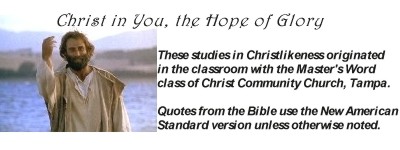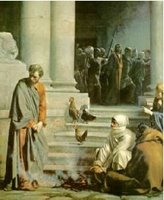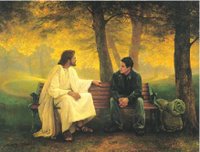 Attaining to all the wealth that comes from the full assurance of understanding, resulting in a true knowledge of God’s mystery, that is, Christ Himself, in Whom are hidden all the treasures of wisdom and knowledge.” --Colossians 2:2-3
Attaining to all the wealth that comes from the full assurance of understanding, resulting in a true knowledge of God’s mystery, that is, Christ Himself, in Whom are hidden all the treasures of wisdom and knowledge.” --Colossians 2:2-3Opening Thought
Making the Commitment
We’ll often go through the experience of deciding we want to do something. It might be a weight loss program, or a career-enhancing certification, or running in the Boston Marathon (don’t worry, I haven’t done that either). So we look into all the requirements, we make the plans, and we think about all the good that will come out of accomplishing this goal.
Then, something very important happens – it’s time to actually start the program, to make the commitment to engage in the required discipline and stay at it for the duration of the program. Remember that feeling? Facing up to this challenge can be a real struggle. Determining to announce to all observers that you’re actually going to do this.
Committing to a life of Christlikeness takes that type of commitment. We can do a lot of looking and thinking about what’s involved, we can think about all the benefits that come if we “complete the program” – both now and in eternity. It’s just that actually-getting-started thing that causes us to pause.
That’s where we are in our study of Christlikeness. We need to hook into some very specific exercises and disciplines that need to be developed into life habits. So let’s go – let’s make the commitment to Christlikeness.
The Mind of Christ - Philippians 2
As we begin our study of exercising Christlikeness in our Christian walk, it will help to look at some of the key passages of Scripture that speak to our understanding of what is involved in seeking this high goal. Paul, in Philippians 2, "strikes the mark" of what Christlikeness means to the believer by stating it as having the "mind of Christ".
1. The Mind of Christ
- Philippians 2:5, "let this mind be in you which was also in Christ Jesus" -- continuously be thinking the same way Christ was thinking; that's why we've spent the last several study sessions looking at snapshots in Christ's life, to get a sense for how He was thinking in those various situations; as Paul explains here, that thought process centered on obedience, humility and servanthood
- 1 Cor 2:14-16, but we have the mind of Christ! After quoting from Isaiah, "who has known the mind of the Lord?", he Paul reminds us that in reality, we do!
- While most of Paul's letter to Philippi is heartfelt, conversational and spontaneous, this passage chapter 2 is more "polished", seemingly carefully thought out.
- Phil. 2 is is a major Biblical statement on Christology, in our being of one mind in Christ (2:1). Doctrinal study, Christology, Pneumatology, Ecclesiology, Eschatology and others -- these are valuable areas of study that you need to spend some time in.
- The bottom line is that all true Christians have (or ought to have) the mind of Christ. So, what is the mind of Christ? Paul points us in the right direction in this passage.
- Phil. 2:6
- Think of grasping as clinging or desperately hanging on to something. This could be like falling in a tree and desperately hanging on to a branch. Or perhaps, picture the child being left at summer camp and clinging tight to the parent, not wanting to be left alone.
- Compare John 1:1-18, the very Living Word of God, choosing to leave heaven's glory and dwell among us. Rather than clinging to His heavenly realm, Jesus Christ took on a mortal body and allowed mankind to observe His glory.
3. Emptied of Self
- Phil. 2:7
- This speaks of how Jesus set aside His independent use of His divine power.
- He emptied Himself of all His heavenly, divine reputation, left behind His ability to claim status or position -- almost as if He had no history at all. Imagine having everything about you that made you special or unique in your life taken away; think of the tragic life stories of black slaves brought to America and treated as having no previous life.
- When Jesus expressed His experience of this, it is not in the sense of playing a part, it is a very real experience.
- Think of what it would take for us to be empty of self, totally devoid of pride & selfishness
4. A Humble Servant
- This "humbling" is a different word than "emptying". Here simply bows low, expressing His intension to serve, demonstrating His relationship to mankind.
- Jesus chose to submit His will, His independent plans, to His Father. From early in His ministry when He expresses His keen sense of knowing His Father's plan and being totally dedicated to it, to just before the Cross, "not my will, but Yours be done."
- Note Matthew 20:28, "just as the Son of Man did not come to be served, but to serve, and to give His life a ransom for many." Also, Mark 10:43-45.
- How does His being described as "humble" match up with some of the dramatic confrontations he created, such as cleansing the Temple? What other instances can you think of? (Think "Pharisees")
5. Obedience
- Perhaps this point helps to understand our question above. Jesus so clearly understood His obedience to His Father that it influenced His every action, it overrode cultural niceties and social prejudice.
- Luke 2:49, "I am here for my Father's business."
- John 8:29, "I always do the things that are pleasing to Him."
- John 12:49, "My Father has given Me... what to say."
- Luke 22:42, "not My will, but Thine be done."
- Overarching every minute of Jesus' life was His sense of Mission: He was here "on His Father's business". The business of delivering once-and-for-all Redemption for mankind. The business of demonstrating the reality of God fulfilling His promises.
6. Patience
- Patience... probably not one of our better traits in the 21st century. Having the ability to comfortably wait while something develops or arrives.
- Beginning at the Cana wedding, Jesus knew His hour had not come (John 2:4); also John 7:30; 8:20. The "hour", He tells us later, speaks of His sacrifice on the Cross -- a crucible of time through which all of human history is drawn.
- The time came when the hour was "come" or "at hand" -- Mark 14:41; John 12:23; 13:1; 17:1.
- "In due time..." -- Romans 5:6; 1 Timothy 2:6; 1 Peter 5:6 -- Please read through these passages and reflect on the patience of Christ.
- Note Hebrews 12:2, "for the joy set before Him, endured the Cross". This enduring had to include His entire life on earth as He anticipated His "hour".
- Jesus was able to work on the basis of a divinely clear knowledge of the End Times. Phil. 2:9-11 sums up the anticipation that Jesus Christ has in seeing the fulfillment of God's "plans for the ages", the culmination of His promises to Israel and the Church (separately!).
7. Paul's Response
- Context is always important in Bible study. Paul's response to this great Christological passage helps us to know what our response should be. If you follow the grammatical "hooks" starting in Phil. 2:12, "So then...", on to 3:1, "Finally...", he brings us to center of His heart in 3:7-14.
- From this great passage, we see the reality of the Christian walk. "Count all things to be loss... that I may gain Him... that I may know Him... I press on toward the goal."
- Beginning to demonstrate Christlikeness in our life requires this deep-heart commitment. We come to the place where this becomes our true passion. The other delights and drama of life become "environmental", just the trappings of this One Thing that truly matters -- Christlikeness.
May the Mind of Christ my Savior
May the mind of Christ my Savior, live in me from day to day;
by His love and power controlling all I do and say.
May the Word of God dwell richly in my heart from hour to hour;
so that all may see I triumph only through His power.
May the peace of God my Father rule my life in everything,
that I may be calm to comfort sick and sorrowing.
May the love of Jesus fill me as the waters fill the sea;
Him exalting, self abasing, this is victory.
May I run the race before me, strong and brave to face the foe,
looking only unto Jesus as I onward go.
May His beauty rest upon me, as I seek the lost to win;
and may they forget the channel, seeing only Him.
For Further Study...
1. Have you thought about how seeking to be like Christ requires discipline and exercise? Would that require some changes in how you approach Christlikeness?
2. On a scale of 1-10 with 10 being perfect, how well do you “look like Christ”?
3. What would be three things you need to work on to make your “score” go up?










